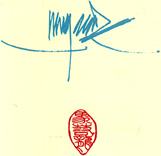Ever since the time when Luís de Camões stepped ashore in Macau, this land has been consecrated to Portugal. The day on which this great poet died is celebrated as Portugal Day, a day on which all Portuguese commemorate his life and works.
Confronted with the threat of losing so much of this legacy, we must remember Camões since he symbolizes the very essence of the Portuguese 'soul'. We must look to his words and work in order to retain our traditions and carry out our intentions.
Recently, then, we have seen the celebrations of Portugal Day on the 10th of June. The celebrations were organized by the Steering Committee and the Instituto Cultural de Macau played a vital role in them. Macau's location, so far from the motherland, means that this territory has had to create its own stamp on history. There can be few other places influenced by Portugal, where Portugal Day is celebrated with such dedication as in Macau where so many contributions from such diverse sectors of the community are made.
This year, Macau was able to see itself from a social and urban historical perspective in the first photographs ever taken of the city. The photographs were taken by Jules Alphonse Itier a mere six years after the first daguerreotypes were produced. The collection belongs to the Musée National de la Photographie in Paris. A seminar was also organized in which historians dealt with the subject "What history do we have, what history could we have?". In addition to these major events, there was a series of cultural programmes including an exhibition of portraits of the Portuguese monarchs by Costa Pinheiro, a reading of Camilo Pessanha's poetry given by Eunice Muñoz and concerts by the Portuguese group "Trovante". The Instituto Cultural's Sinfonietta Orchestra, conducted by Jorge Matta gave a concert with solo violinist Aníbal Lima.
In addition, groups were invited from places which had historical and cultural contacts with Portugal. This year, the Grupo Folclórico de Damão visited Macau to give us a taste of Indo-Portuguese music. There were several occasions on which to savour this particular style of music, as they played not only by themselves but with other folk groups during the 10th of June celebrations.
Then, as the crowning glory of all these activities, Macau hosted a performance of Fado. Amália Rodrigues, the most famed of all Fado singers, gave a memorable performance. Indeed, she is an example of what is essentially Portuguese.
Amália came to Macau to contribute even more soul to the scene set by Camões, Bocage, Wenceslau and Pessanha, investing her emotions in a gesture which I hope was understood by all the Portuguese who were witness to it. Portuguese from Macau and the motherland should, after four hundred years of undeniable influence in Macau, devote the best of their generous hearts to consolidating and building the huge Portuguese family in the future. Wanderlust cannot be the only destiny for our cardboard suitcase dampened with nostalgia.

start p. 3
end p.